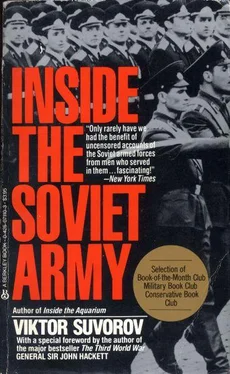The average expectation of life in a mine-clearing battalion was, if anything, lower than that in the penal battalions which served with the infantry.
The death rate among the `flying convicts' remained exceptionally high. This did not greatly concern anyone — this was their inevitable fate. Unfortunately though, when an air-gunner was killed, his machine-gun would slip from his hands and its barrel would drop lifelessly downwards. This was a useful signal to the German fighters — the gunner in that aircraft has been killed, so the aircraft is defenceless. Let's get it!
The Soviet command finally realised, after questioning a number of German airmen who had been shot down, that, as he died, the air gunner was involuntarily signalling to the enemy that his aircraft was undefended. What could be done? You could not get two flying convicts into one cabin — and what would be the point, in any case, since the same burst of fire might kill both of them. Much thought was given to the problem. Then a brilliant idea occurred to Marshal of the Air Forces A. E. Golovanov, Stalin's former personal pilot and bodyguard, whose job it had been to arrest marshals and generals for his master and to conduct them to Moscow. He thought of the idea of fixing a spring to the breech of an aircraft's machine gun. Whether the gunner was alive or not, the barrel of the gun would now keep pointing upwards. For this invention Stalin rewarded this favourite of his with the Order of Lenin.
4
In peacetime the penal battalions are known as Independent Disciplinary Battalions. Each commander of a Military District is responsible for two or three of them. Commanders of Groups of Forces stationed outside the USSR also have battalions of this sort under their command, but they are stationed on Soviet territory.
The disciplinary battalions have been organised in precisely the same way as the wartime penal battalions-administration, a guard company and three penal companies. In peacetime the officers serving with these battalions are paid at double rates — for each year of service they receive two years' pay and two years towards their pension.
The soldiers and sergeants on the permanent staff of these battalions have been sent to them by military tribunals which have sentenced them to work there for periods of between three months and two years. Time spent in a disciplinary battalion does not count as part of a soldier's military service. In my division, on one occasion, two sergeants got drunk the day before they were to be demobilized after two years' service. In their drunken state they were insufficiently respectful towards one of the staff officers. A tribunal sentenced each of them to lose his rank and to serve for two years with a disciplinary battalion. After two years they returned to the division, completed their remaining day's service and were demobilized.
Life in a Soviet disciplinary battalion today is a large subject, which should be discussed at length and separately. I will limit myself to saying that such a battalion will break the strongest of characters within three months. I have never, during my entire service, met a soldier who had spent time in one who showed the slightest traces of disobedience or indiscipline. It is a great day for any commanding officer in the Soviet Army when his unit is re-joined by someone whom everyone has forgotten and whom very few will recognise — a man sent to a disciplinary battalion some time ago for insubordination, or indiscipline or for some form of protest. The officers in the regiment and the division have mostly changed since his day, as have the overwhelming majority of sergeants and other ranks. Suddenly, he appears — quiet, downtrodden, submissive. He talks to no one and carries out all orders or instructions uncomplainingly. It is impossible to get him to say a single word about where he has been or what he has seen. His answers are monosyllabic and expressionless — `Yes' and `No' seem to be the only words left in his vocabulary. Then suddenly one of the longer-serving soldiers remembers — this was Kol'ka, the trouble-maker, the wit, a live-wire, forever suggesting risky escapades, who sang and played the guitar and was adored by all the local girls. Eighteen months ago he was sent to a disciplinary battalion for some trifling offence. The younger soldiers, gazing at this silent, gloomy new arrival, can only half-believe what they hear. The regiment quietens down, discipline improves, more respect is shown to its officers.
For minor offences a soldier does 3 to 15 days in the unit's guardroom. Any soldier who spends more than 45 days there in a year is automatically sent to a disciplinary battalion. There he is reformed: after he returns to his unit he will never again commit a disciplinary offence. He will never want to sit behind bars again.
Nevertheless, if war with the West should break out, Soviet soldiers would surrender by the million. Disciplinary or penal battalions would not prevent this from happening. And the Politburo has no illusions about this.
PART EIGHT
THE OFFICER'S PATH
1
I arrived at divisional headquarters early in the morning. The duty officer, a Lieutenant-Colonel, was welcoming. He had not slept all night and he might well have told me, peevishly, to go to hell. As it was, my brand-new lieutenant's shoulder-boards seemed to strike a chord in his memory, and he just smiled to himself and said, `Go out and take a walk for half an hour or so. It's still a bit early.
Half an hour later I returned to divisional HQ and was taken straight to the office of the head of the personnel department. He, too, was pleasantly welcoming. He had been sent my personal file a month earlier. After I had finished my training, I had taken my first leave as an officer, like all my companions from the military training college, but my file was already lying in front of this personnel officer, on that table, and at night it had been put in that safe over there. Probably he knew me better than I knew myself. He took a long look at me and then asked one question, which I had, of course, been expecting:
`How about changing to First Specialisation?
Each military trade is referred to by a number. Before the war there were about 150 of them. Nowadays there are more than 1,000. But all-arms commanders are all First Specialisation men — and they are the ones who ensure that all the different arms of service and Armed Services work together properly. Those who command motor-rifle platoons, companies, battalions, regiments, divisions and all-arms Armies, Fronts and Strategic Directions are all First Specialisation officers. The Supreme Commander, too, has the same background. I am a tank officer and I love tanks, but now they are offering me an infantry job — one which is more difficult, but which has better prospects. The cushy jobs are always full, but there is a constant and acute shortage of officers in the infantry. Platoons are commanded by sergeants, because there are not enough lieutenants. In the infantry, one's chances of promotion are very good, but they are never able to find enough people who are prepared to put up with the hardships of infantry life. So they often ask officers with other specialisations — officers with tank, anti-tank and mortar training — this question.
`I am in no hurry. You've got time to think it over — and it is something you need to think about. Nevertheless, the personnel officer looks at me expectantly. I do not usually take long to make up my mind. I stand up and say, decisively, `I wish to transfer to First Specialisation.
He likes my reaction, perhaps not because he has succeeded so easily in getting me to volunteer for such a hellish job, but simply because he respects a positive attitude.
Читать дальше












